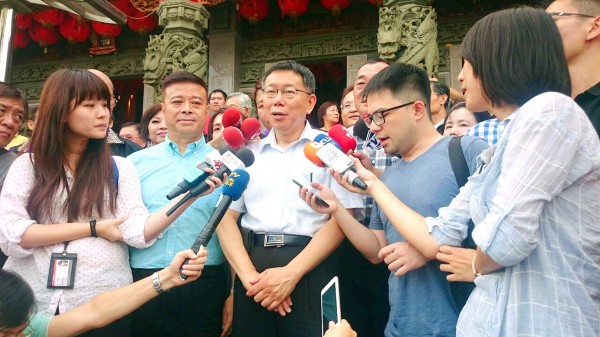《TAIPEI TIMES 焦點》 MA-XI MEETING: Ma stance implies ‘brain damage’: Ko

Taipei Mayor Ko Wen-je, center, talks to reporters yesterday while visiting the Shengan Temple in Keelung with People First Party Secretary-General Liu Wen-hsiung, second left. Photo: Yu Chao-fu, Taipei Times
‘AMBIGUOUS’: The so-called ‘1992 consensus’ only matters if its premise is addressed in full, as without that the term is nothing more than a ‘title,’ Ko said
By Sean Lin / Staff reporter
Taipei Mayor Ko Wen-je (柯文哲) yesterday said that the so-called “1992 consensus” is a term that lacks substance, and that President Ma Ying-jeou’s (馬英九) trumpeting of the Beijing-backed “one China” principle in Singapore could indicate that he is suffering from “brain damage.”
Ko made the remarks in response to media queries while accompanying People First Party legislative candidate Liu Wen-hsiung (劉文雄) to pray for good fortune at Keelung’s Shengan Temple.
Despite repeatedly saying that he would refrain from criticizing Ma, Ko could not contain his frustration over Ma’s performance at the Singapore summit.
“How could you have asserted the ‘one China’ principle? Have you suffered brain damage?” Ko said, in response to Ma’s statement that the “1992 consensus” is subject to the “one China” principle, while omitting the “different interpretations” component typically stressed by his administration.
The consensus, a term former Mainland Affairs Council chairman Su Chi (蘇起) admitted that he fabricated in 2000, denotes a tacit understanding that there is only one China, with both sides of the Taiwan Strait having their own interpretations of what that means.
As for Ma’s description of the “1992 consensus” as “ambiguous, but capable of solving problems,” Ko said: “As I see it, it is ambiguous, but it has not solved any problems.”
The “1992 consensus” only matters if its premise is addressed in full, as without that it is nothing more than a “title,” Ko said.
Since Xi did not attend the post-summit press conference arranged by Chinese authorities, instead sending Taiwan Affairs Office Minister Zhang Zhijun (張志軍) instead, Ko said that Ma should not have presided over his own press conference, but assigned the task to Zhang’s counterpart, Mainland Affairs Council Minister Andrew Hsia (夏立言).
“If it was up to me, I would have just asked Hsia to hold the press conference,” Ko said.
Beijing’s handling of its press conference has drawn criticism, with many Taiwanese commentators saying that Ma and Xi reneged on their pledges to ensure that Taiwan and China are treated equally and with mutual respect.
Ko hit back at Ma’s apparent swipe during his press conference of the mayor’s “2015 new standpoint” on cross-strait relations, which he proposed at the annual Taipei-Shanghai forum.
Ma said that the “1992 consensus” should serve as the sole reference in cross-strait relations, as it is “unlike red wine, which has a different year [stamped on every bottle].”
“Is he suggesting that he sells different wine each year in the same package?” Ko said.
Asked if he would follow the “model” on cross-strait exchanges Ma created with the “1992 consensus” when meeting Shanghai officials at future forums Ko said: “As I said, it is nothing more than a title. Ma should explain what its content is.”
新聞來源:TAIPEI TIMES

















